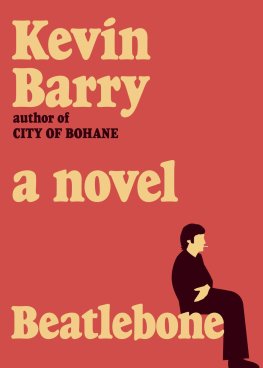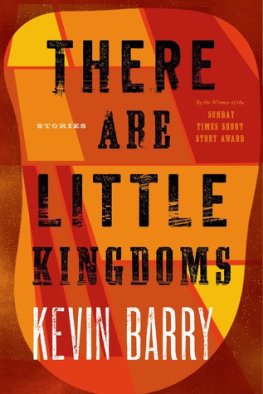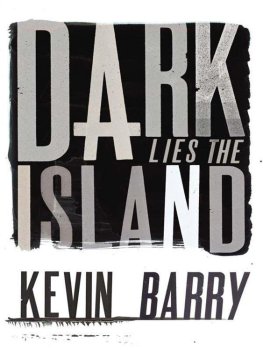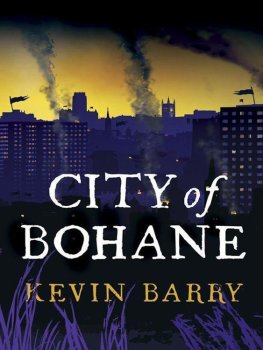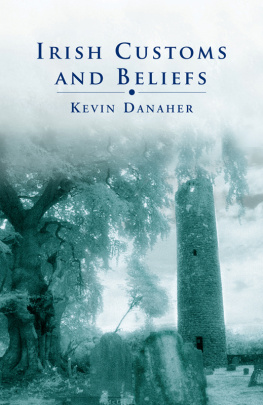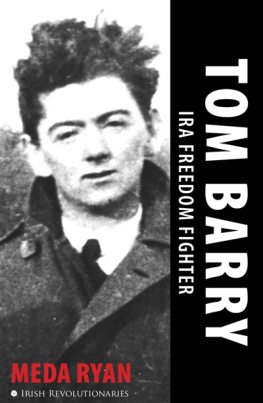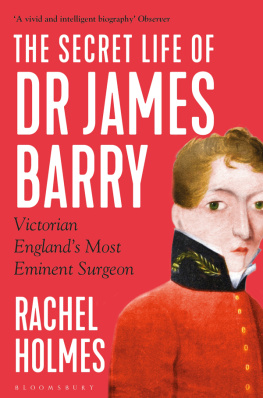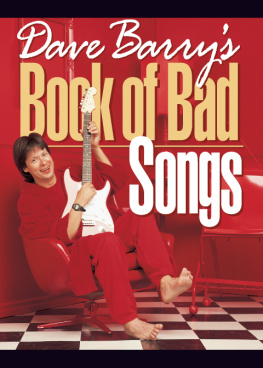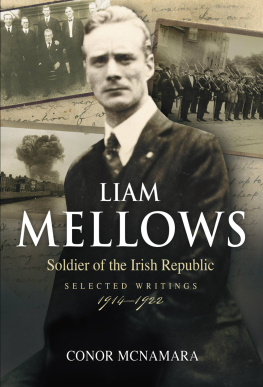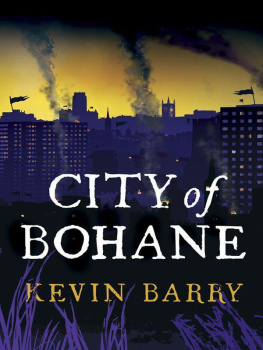KEVIN
BARRY
In memory of Patrick Barry Moloney MA
(19271989)
Eunan OHalpin , Professor Emeritus of Contemporary Irish History at Trinity College Dublin, is a grand-nephew of Volunteer Kevin Barry, Dublin Brigade, executed in November 1920, and of Captain Paddy Moloney, 3rd Tipperary Brigade, killed in combat in May 1921. His major works include The Decline of the Union: British Government in Ireland, 18921920 (Gill & Macmillan, 1987), Defending Ireland: the Irish State and its Enemies (Oxford University Press, 1999), Spying on Ireland: British Intelligence and Irish Neutrality During the Second World War (Oxford University Press, 2008), and (with Daith Corrin) The Dead of the Irish Revolution (Yale University Press, 2020).
KEVIN
BARRY
AN IRISH REBEL IN
LIFE AND DEATH
EUNAN OHALPIN

First published in 2020 by
Merrion Press
10 Georges Street
Newbridge
Co. Kildare
Ireland
www.merrionpress.ie
Eunan OHalpin, 2020
978-1-78537-349-7 (Paper)
978-1-78537-350-3 (Kindle)
978-1-78537-351-0 (Epub)
A CIP catalogue record for this book is
available from the British Library.
All rights reserved. No part of this publication may be reproduced,
stored in a retrieval system, or transmitted, in any form or by any
means (electronic, mechanical, photocopying, recording or
otherwise), without the prior written permission of both
the copyright owner and the publisher of this book.
Typeset in Sabon Lt Std 11/15.5 pt
Front cover image courtesy of Canvaz (canvazstreetart.com).
Contents
Preface
T his book was the brainchild of my second cousin Sofra ODonovan, who developed the idea of a new historical treatment of our shared great-uncle Kevin Barry and suggested to me that I take part.
Both Sofra and I have other family links to the Irish revolution, Sofra through her grandfather Jim ODonovan, for years the IRAs leading expert on explosives and a significant republican intellectual, although now remembered largely for his disastrous dalliance with Nazi Germany, and I through the Moloneys of Tipperary and the Halpennys and Rices of Down. The interplay between those connections, and Kevin Barrys life and afterlife, is a marked feature of what follows.
One reason why I was initially hesitant about the idea of writing a book on Kevin Barry is that Sofras late father Donal ODonovan (19282010) produced a good one, Kevin Barry And His Time , as long ago as 1989. It was that which first led me to realise that Kevin was something more than a plaster saint with a jammed automatic in one hand, rosary beads in the other, and a rope around his neck. The case for producing a further study, lay in the fact that a lot more material is now available both in official records and in family papers. Also, while we are blood relatives, we are two generations away from Kevin, not that Donal was unduly reverential. Indeed, perhaps the best summation of his balanced analysis of Kevins life comes in his poem A Crowded Year, with its memorable opening Are you the nephew of? This itemises Kevins serial departures from the straight and narrow in terms of girls and drink.
This study reflects my own interests and perspective, and is less a retelling of Kevins story than a reflection upon the dynamics of having a martyr in the extended family and an exploration of how and why his name has continued to resonate in Irish republican as well as popular culture.
Covid-19 has had a significant hand in this book: it has meant the closure of libraries and archives and has made travel even within Ireland impossible. I had left it until March to do final research in the Jim ODonovan, Donal ODonovan, Piras Basla and Sen OMahony papers in the National Library, in various series in the National Archives, and in the Elgin ORahilly, Sighle Humphreys, Katherine Barry Moloney, Patrick Barry Moloney, Moss Twomey and other collections of papers in UCD Archives. I had also planned to do some further research in the Bodleian Library in Oxford and in the British Library in London, to visit the Barrys Carlow homestead, Tombeagh. All other descendants of the Barrys have just as much right as do I to pronounce upon their great-uncle and the impact of his fate upon their families.
Acknowledgements
I am extremely grateful to Sofra, to my Barry and ORahilly relatives and to the many selfless archivists in the various libraries and archives in Ireland and Britain whose holdings I have cited, and to Dr Eve Morrison, who has found time in the midst of her own writing to hear me out on how mine was progressing. I must particularly thank Professor Ruth Barton, Damien Burke of the Jesuit Archives, Professor Iseult Honohan, Charles Lysaght, Dr Roisin Kennedy and Orna Somerville of UCD, Oliver Murphy, Peadar Nolan, Manus ORiordan, Oliver Rafferty SJ, and Jeanne Winder. I also want to thank Barry Bowman, Frank Callanan SC, Hugh Hartnett SC, Roger Sweetman SC and Alice Harrison BL for their observations as experienced lawyers on Kevins court martial, and Colonel Terry ONeill PhD for his humorous recollections of the commemorative culture of the OConnell School in the early 1950s. In America Aedeen Clements of the University of Notre Dame, in Britain Dr Jan Glaser of Stonyhurst College and in India Professor Jyoti Atwal of Jawaharlal Nehru University answered last-minute queries. In Ireland Dr Ciara Breathnach, Dr Patrick Callan, Professor Anne Dolan, Professor John Horgan, Dr Patrick McCarthy, Dr Deirdre McMahon and Daith Ceallaigh all read the final drafts, each identifying problems that needed attention, most of which I hope I have addressed. Finally, I must thank my extremely patient copy editor Djinn von Noorden, editor Patrick ODonoghue and publisher Conor Graham.
I thank the following institutions and holders of copyright for access to and permission to quote from collections of papers and other material: Richard Barrett (the J.V. Joyce diaries, since deposited in the Military Archives); the Bodleian Library (the A.P. Magill papers); the British Library (India Office records and Sir Olaf Caroe papers); Brian Fitzpatrick (the John Fitzpatrick memoir); Carlow County Library and Archives (Carlow Union minute books); the Controller of Her Majestys Stationery Office; the Director of the Military Archives; the Director of the National Archives of Ireland; the Director of the National Library of Ireland (the Liam Deasy, Florence ODonoghue, James ODonovan and Sean OMahony papers); the Imperial War Museum, London (the Lord French and Sir Henry Wilson papers); the Jawaharlal Nehru Memorial Library and Archives, Delhi (Oral History Transcripts); the Keeper of the Public Records of Northern Ireland; Kerry County Library and Archives (the Con Casey papers); the Kings College London Liddell Hart Centre for Military Archives (the Foulkes papers); Lambeth Palace Library (the Archbishop Davidson papers); Leitrim County Library, Ballinamore (oral history collection and McGoohan memoir); the Master, Fellows and Scholars of Churchill College in the University of Cambridge (the Amery and Strang papers); Monaghan County Museum (the Thomas Brennan and Father Marron papers); New York University Tamiment Library (the Sen Cronin papers); the Parliamentary Archives, London (the Bonar Law and Lloyd George papers); the Patrick and Katherine Kavanagh Trust (lines from News Item); the Peoples History Museum, Manchester (the Palme Dutt papers); the Royal Irish Academy (the Kevin B. Nowlan papers); UCD Archives (the Kevin Barry, Kevin Barry Memorial Committee, Katherine B. Moloney, Patrick Barry Moloney, Richard Mulcahy and Moss Twomey papers; Villanova University Library (the Joseph McGarrity papers); and the Westminster Diocesan Archives (the Cardinal Bourne papers). Over the years Kevin Barry, Louise ODonovan, Sofra ODonovan, Celie ORahilly, Michael ORahilly and Ruth Sweetman showed me important family material, and Fiona Maher kindly sent me a characteristically light-hearted letter from Kevin to Kitby, now held in Trinity College Dublin Manuscripts and Archives. Finally, I am grateful for access to Dan Breens journals, which are in private hands.
Next page

